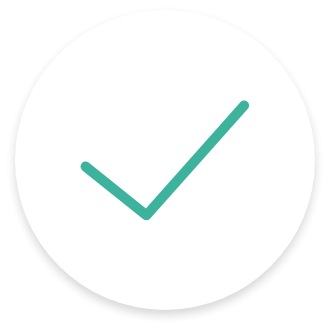IoT mobile apps are here to stay as they have brought additional convenience and value into our lives. With wireless networks and revolutionary sensor-based smart devices, IoT is the next big thing. The IoT mobile app development industry is getting ahead with emerging technologies and demand for better user experiences. Thus, more and more development companies are leveraging the power of the Internet of Things (IoT).
IoT apps are a platform where sensors and cloud systems are connected to the internet and multiple mobile devices to collect and exchange data for smart functioning. Smart homes, cybersecurity, and connected cars are the most significant examples of IoT based applications.
Popularity/Market Analysis and Potential of IoT Applications
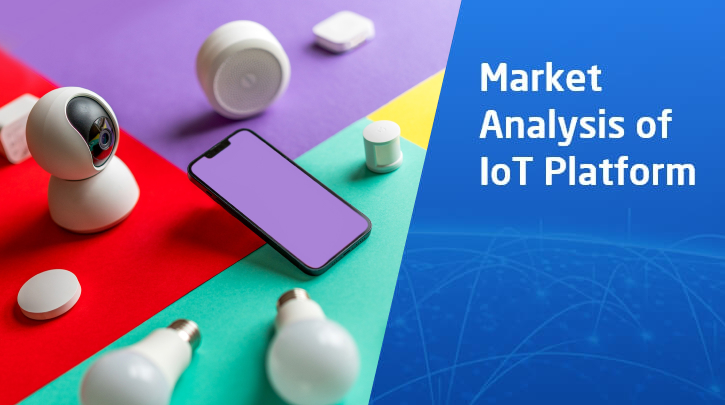
There is no doubt as to why big enterprises and global brands are heading towards IoT app development and other emerging technologies. IoT is not new to the technology world, but what makes it popular today is the better relations with big data, security, privacy, and software-defined networking (SDN) to provide improved collaboration and data management.
It is estimated that by the year 2024, smartphone usage and IoT mobile applications will be around $600 Billion. More than 60% of the global companies are expected to choose IoT platforms and applications to transform their businesses with faster and smarter user experience.
Whether it’s home automation, telemedicine, or industrial automation, IoT can make things way smarter than we could ever think. This is the reason why businesses these days are jumping to find the best IoT development consulting at the best cost. Here are the major reasons why you should leverage IoT app development for a better business approach.
Essential Features of an IoT Application
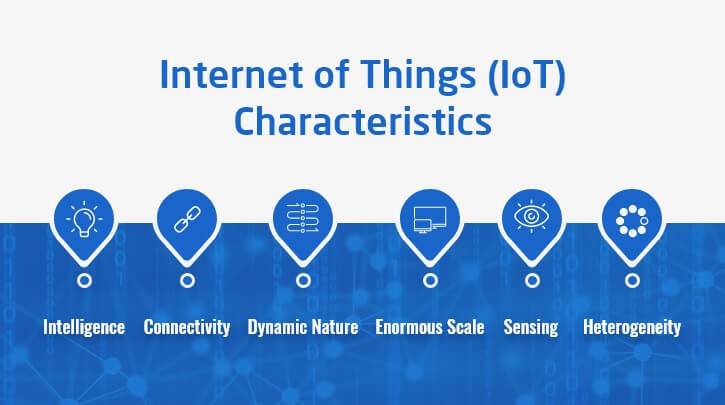
Here are the essential features of an effective IoT App which plays a key role in making your app a good fit for users and businesses. There are some IoT tips and tricks also involved in the process and you will find them described in the points below.
✓ Software & Platform
Since it is cloud-based application, your IoT app, its web app, and mobile applications need to be developed on the right platform. Your software should be able to connect and control the devices, and the dashboard should collect the information and present it to the user in a clear and concise format. You can consult an IoT solution provider for finding the right platform and software.
✓ Hardware
Before starting the development, you need to decide whether you are ready to use third-party hardware or custom hardware. Your mobile device will also be a part of your hardware. So, you must choose the right hardware to work over the internet and Bluetooth with low energy sensors. There are experts and companies that provide IoT Development consulting which can help you make the decision quicker.
✓ Network
The role of the network is to process the data from a mobile device to sensors and devices and receive it back. Your selected network will link all the devices within the IoT apps system. During the IoT Mobile app development, you can choose Bluetooth as a network for transmission of data between the mobile app and device.
✓ Cloud
Cloud is among the major components of the IoT system, which processes and manages the data without any physical storage device. Cloud Storage technology has significantly helped the developers to efficiently manage data in developing secure IoT apps.
✓ UI/UX Design
Creating an IoT application with intuitive UI/UX design is a big challenge due to the complex structure of an IoT system. Make sure you include personalized user experience, smart alerts, notifications, and appealing data visualization. Designing the UI seems simple, but for the user, it is an essential component because the user of IoT apps will interact with the device through this interface only.
Whether its IoT home automation, a cybersecurity IoT app, or IoT for Healthcare, if you have worked carefully on the features of your IoT application, the end outcome will produce amazing results.
How Does an IoT Mobile Application Work?
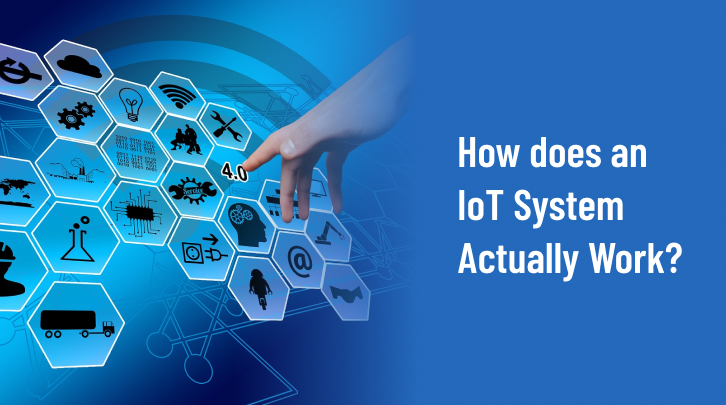
The Internet of Things or IoT is an intelligence system that is connected and accessible to information through the internet. To understand its benefits for your business, you must understand the process.
Let’s take a car insurance company for instance.
Car insurance companies can develop an application that is connected to a device that lets them know the driving style and safety of the driver. The quality of driving depends on the number of accidents and rules he follows on the road, which affects the insurance cost and benefits. Hence, the app will collect the data from the device and transmit it to the server.
Simply put, IoT apps are connected to smart devices with the help of the Internet and can read and transmit the data to multiple business systems. This may seem a bit complex, but for data engineers and technology enthusiasts, it’s a highly beneficial technology that is changing the ecosystem of organizations. Consulting a company that has IoT development services should be the first step to better understand the technicalities involved and the process.
Important things to keep in mind while developing an IoT application
Getting an IoT-equipped app idea is great, but it is not as simple as creating a business mobile app. There are many security concerns and development aspects that you need to keep in mind during IoT mobile app development. Here are some major tips to develop a successful IoT Application.
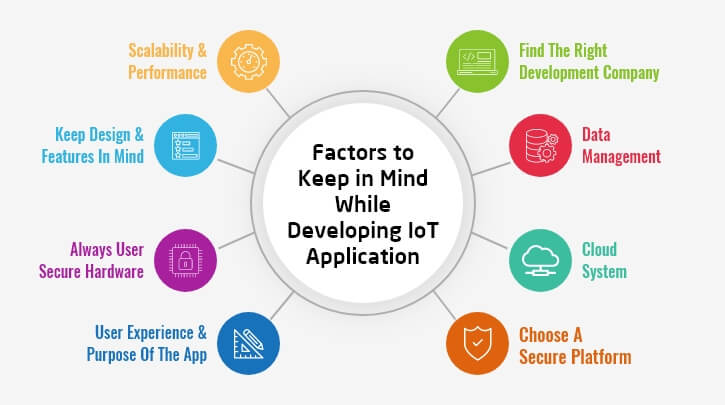
* Always Use Secure Hardware
IoT Apps connect mobile apps to smart devices like a sensor. To make sure that your app is safe, the attached devices need to be double-checked and purchased from reliable vendors who produce smart devices with additional security measures. To ensure maximum hardware security, check the EPID of a device, which stands for Enhanced Privacy Identity, for reducing the chances of hacking or threats.
* Keep Design & Features in Mind
IoT mobile apps are here to stay and help simplify daily life. Routine tasks will continue to become simpler and more time-efficient due to smart connectivity. Whether an app is for improving your business or providing a better user experience, you need to make sure that you have conveyed the objectives clearly to the development team or IoT app development company. Your app must be convenient to use and should remain useful for a very long time. Therefore, you should research the design and functionalities of an IoT app and support your development team to create something unique and effective.
* Scalability & Performance
While developing IoT software, considering scalability and high performing data streaming is very important. As data is being transmitted from hundreds of devices, your company needs to prepare accordingly before launching such a potential app into the market. A large volume data transmission mechanism is a must when it comes to leveraging IoT for app development and making sure that the process is secure and reliable.
* User Experience & Purpose of the App
An important factor to consider when developing an IoT mobile app is to make it as useful as possible for your end-users. Try to connect with your potential customers and learn what they expect from the designs and features that make their life simpler with smart devices. Contemplate how the app will communicate between data and user instructions and what type of user interface you need to create for a successful app. This is a crucial point, and you must consult an IoT Mobile app development company for determining this.
* Find the Right IoT Development Company
No matter how good your mobile app idea is and how effectively you have planned to combine IoT with your business mobile application, if you don’t have the right developers, everything can turn out to be a disaster. It is important to conduct research and find the most experienced companies or development teams that help with emerging technologies and have offshore software solutions. Partner with an agency that ensures functionalities and effectiveness. An agency that has an expert understanding of the possibilities of IoT and interactive mobile apps will set your idea up for success.
In addition to this, check if the IoT solution provider has the right information on programming and IoT platforms. Additionally, they need to be comfortable with your involvement during development and testing, as working collaboratively will lead to a long-lasting professional relationship.
* Data Management
IoT devices collect, analyze, and utilize the data in real-time. As a result, the most important part of data management is to ensure data security and encryption with a data management roadmap. Below are the details of a data management scenario.
1) Data Collection: An IoT app collects data from all the mobile apps and connected devices for app-specific data integration. On the other hand, data generated from the sensor and smart devices are called event-based data collection. These are the main data capturing scenarios, which can be updated with user-generated data capturing done with a mobile app feature where users want the app to collect specific data with a real-time input.
2) Create a Buffer: After the data has been collected, the system needs to create a buffer or cache of the total capture data. This is a complicated procedure as you cannot calculate the data volume coming from thousands of devices in real-time. With your data retention policy, your system can evaluate how much data will be stored, and which will be temporary storage to work as a buffer.
3) Data Transmission: Once the data has been collected and filtered, transmitting it via the internet is the most essential step in IoT. There are suitable protocols like RFID, NFC, Wifi, Bluetooth, LiFi, and so on, which can be used for data transmission between the device and mobile app users.
Keeping all these factors in mind, you need to find a team that understands the complexity of data integration and security.
* Cloud System
To ensure fast data delivery to every device, you need to choose a centralized storage system based on cloud storage. This cloud storage system supports the efficiency and cost-effectiveness of IoT mobile apps with minimal operating costs and technical requirements for data management.
* Choose a Secure Platform
IoT mobile apps are created on digital platforms and can be designed by expert teams for individual app purposes. There are also many ready-made platforms available such as AWS, IBM Watson, Azure IoT Suite, and more. These IoT platforms are equipped with security features like data encryption and authentication that make it easier to focus on mobile app development. Using a predesigned, well-structured framework will help you avoid hazards and unexpected issues in the future.
Communication between the devices to the IoT platforms needs to be considered as your top priority to fulfill the communication gap. If not, there will be no sense in investing in an IoT system that can not communicate over a higher range of file transfer ratio. Make sure your development team understands the basic requirements to overcome communication obstacles and provide the best results.
How to Determine IoT App Development Cost?
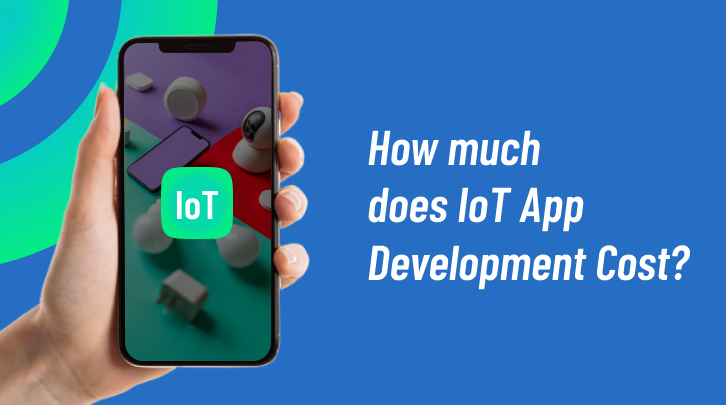
The approach of reducing human intelligence in digital operations has already been implemented in many sectors ranging from banking to smart home technology. To simplify human lives, there is a complicated process of combining mobile applications to a data transmitting device through the Internet. As a result, you must be aware of the various factors that influence development investment, such as:
- Initial Purchases
- Features of IoT App
- App Security
- Device Type
- UI/UX Complexity
- Development & Testing
- Post Development Support
- Operating System
- Readymade Platform & API Integration Cost
- Content & Graphics
Recommended Reading-
How Much Does It Cost to Develop an App?
Apart from these, the investment cost is also affected by hardware development and optimization required from scratch. You need to test and seek consultation about existing hardware options. Developing hardware from scratch can become a costly phase, as it includes analysis, design, development, and testing. On the other hand, the specific type of IoT app also has a considerable impact on the development cost.
Overall Development Cost of IoT Application:
With all the factors and phases considered for developing an IoT app, the cost can be estimated based on project size, development charges, features, and other specifications. For a basic IoT app development, you have to invest around $15,000 to $20,000, and for standard projects, it can reach up to $25,000. For a bigger app or software, you can expect it to reach around $30,000 or more as complexity increases with the size of your application.
Expert IoT Development Solutions For Every Business Vertical
Most companies still find it difficult to understand the complicated structure of IoT apps. However, there is loT research and sources available that indicate the rapid growth of IoT apps in the coming years. Keeping this potential in mind, your company should come up with a successful idea to make useful IoT software. To achieve this, you should consider hiring an expert IoT software development company that can handle the complexity and responsibilities of creating a unique and successful application for your customers.
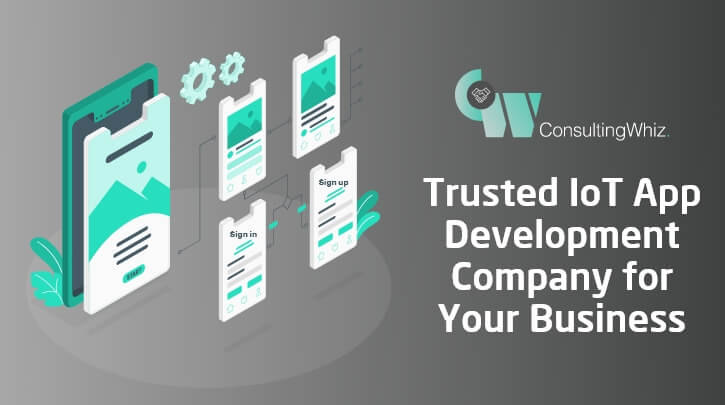
ConsultingWhiz is a Mobile App development company USA that develops cutting-edge IoT products that not only connect artificial intelligence to human intelligence but ensure speed, scalability, and success aligned with your IoT app idea. With vast experience in the industry, we have been able to create industry-specific IoT software solutions to our clients from all over the world. Whether you have a small software requirement or a large scale IoT mobile app project, we ensure seamless functionality and provide optimal user experience to your end-users at the most competitive cost.

Mike is the founder of ConsultingWhiz LLC, Software development company in the USA, he has 15+ years of experience in agile technologies and development. I’ve worked with many satisfied owners of customer servicing businesses. Let’s connect today to get started on your path to 100% automation, reduced overhead costs, large ROI, and so much more.
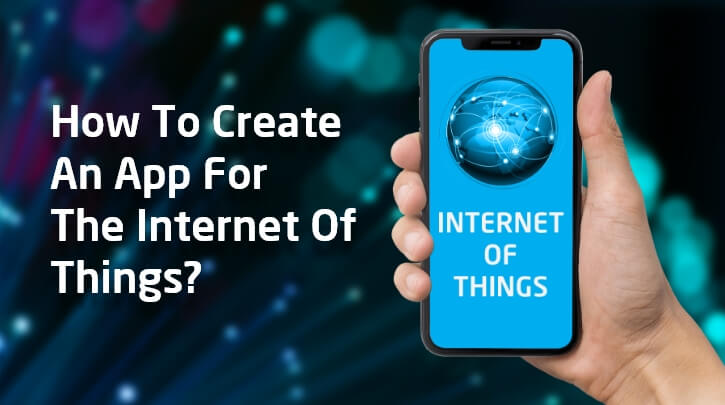

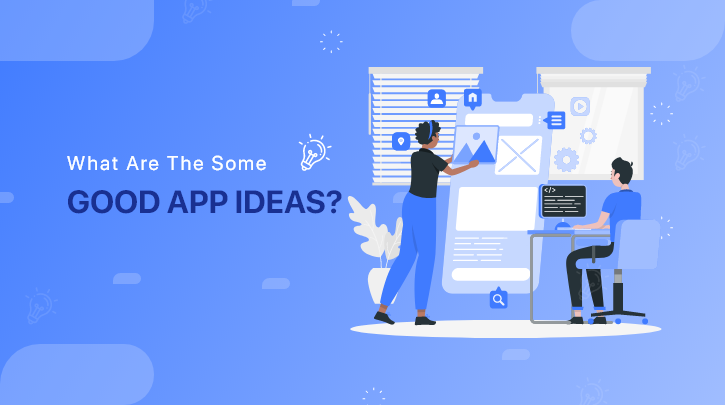
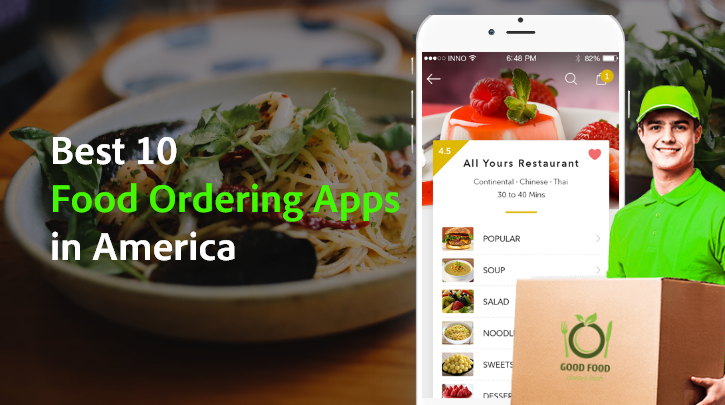
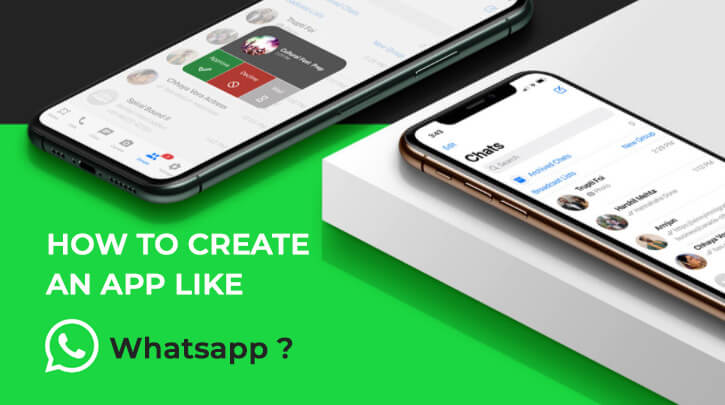
 Mobile App development
Mobile App development Web Development
Web Development Custom Software Development
Custom Software Development Iot Development
Iot Development
 949 656 9676
949 656 9676 contact@consultingwhiz.com
contact@consultingwhiz.com
